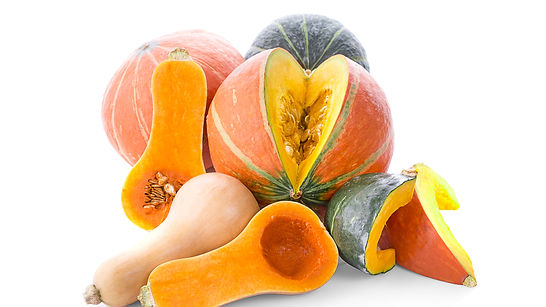top of page
Squash

Nutrient Content : Vitamins & Minerals
(Based on 100g in raw form)
Fiber | Calcium | Iron | Magnesium | Potassium | Phosphorus |
|---|---|---|---|---|---|
2 g | 48 mg | 0.7 mg | 34 mg | 352 mg | 33 mg |
Sodium | Zinc | Copper | Manganese | Selenium | Choline |
|---|---|---|---|---|---|
4 mg | 0.15 mg | 0.07 mg | 0.2 mg | 0.5 mcg |
Vitamin A (mcg/IU) | Vitamin B1 (Thiamin) | Vitamin B2 (Riboflavin) | Vitamin B3 (Niacin) | Vitamin B5 (Pantothenic Acid) | Vitamin B6 |
|---|---|---|---|---|---|
Vitamin B9 (Folate/Folic Acid) | Vitamin B12 | Vitamin C | Vitamin D | Vitamin E | Vitamin K |
|---|---|---|---|---|---|
21 mg |
What It Helps:
How It Helps:
Winter Squash: Acorn, Butternut, & Pumpkin
Summer Squash: Zuccini, Crookneck, & Pattypan
Carotenes found in squash can help against sun damage.
Pumpkin seed can help maintain blood sugar levels
Tips & Other Info.
Two types of squash: summer & winter.
Zuccini, crookneck, and pattypan squash are all summer squash. The seeds have been used to protect against kidney stones, high blood pressure, as well as urinary system issues.
Pumpkin, butternut, and acorn squash are winter squash
Gardening Tips & Info.
Here are some planting tips and information if you want to have this plant in your own backyard (or front yard)

Planting Season

Harvesting Season

Pruning Season

Watering Schedule

Sunlight Exposure

Potted / In Ground
Winter Squash: Sow in summer (June)
Summer Squash: Sow in mid spring (April) | Summer Squash: Late summer (July-August) to early fall (September)
Winter Squash: Early to mid fall (September-October) |
bottom of page

